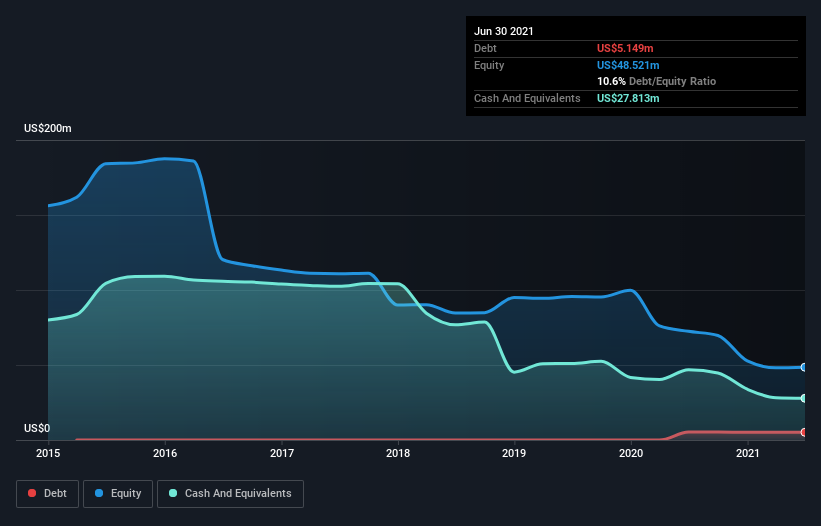Marchex (NASDAQ:MCHX) Is Using Debt Safely
David Iben put it well when he said, 'Volatility is not a risk we care about. What we care about is avoiding the permanent loss of capital.' So it might be obvious that you need to consider debt, when you think about how risky any given stock is, because too much debt can sink a company. As with many other companies Marchex, Inc. (NASDAQ:MCHX) makes use of debt. But the more important question is: how much risk is that debt creating?
Why Does Debt Bring Risk?
Generally speaking, debt only becomes a real problem when a company can't easily pay it off, either by raising capital or with its own cash flow. Ultimately, if the company can't fulfill its legal obligations to repay debt, shareholders could walk away with nothing. However, a more frequent (but still costly) occurrence is where a company must issue shares at bargain-basement prices, permanently diluting shareholders, just to shore up its balance sheet. Of course, the upside of debt is that it often represents cheap capital, especially when it replaces dilution in a company with the ability to reinvest at high rates of return. The first step when considering a company's debt levels is to consider its cash and debt together.
See our latest analysis for Marchex
What Is Marchex's Net Debt?
As you can see below, Marchex had US$5.15m of debt, at June 2021, which is about the same as the year before. You can click the chart for greater detail. But it also has US$27.8m in cash to offset that, meaning it has US$22.7m net cash.
How Strong Is Marchex's Balance Sheet?
According to the last reported balance sheet, Marchex had liabilities of US$19.2m due within 12 months, and liabilities of US$2.52m due beyond 12 months. On the other hand, it had cash of US$27.8m and US$9.14m worth of receivables due within a year. So it actually has US$15.3m more liquid assets than total liabilities.
This short term liquidity is a sign that Marchex could probably pay off its debt with ease, as its balance sheet is far from stretched. Simply put, the fact that Marchex has more cash than debt is arguably a good indication that it can manage its debt safely. When analysing debt levels, the balance sheet is the obvious place to start. But ultimately the future profitability of the business will decide if Marchex can strengthen its balance sheet over time. So if you want to see what the professionals think, you might find this free report on analyst profit forecasts to be interesting.
In the last year Marchex wasn't profitable at an EBIT level, but managed to grow its revenue by 102%, to US$53m. So its pretty obvious shareholders are hoping for more growth!
So How Risky Is Marchex?
By their very nature companies that are losing money are more risky than those with a long history of profitability. And in the last year Marchex had an earnings before interest and tax (EBIT) loss, truth be told. Indeed, in that time it burnt through US$9.8m of cash and made a loss of US$17m. But the saving grace is the US$22.7m on the balance sheet. That kitty means the company can keep spending for growth for at least two years, at current rates. The good news for shareholders is that Marchex has dazzling revenue growth, so there's a very good chance it can boost its free cash flow in the years to come. High growth pre-profit companies may well be risky, but they can also offer great rewards. When analysing debt levels, the balance sheet is the obvious place to start. But ultimately, every company can contain risks that exist outside of the balance sheet. To that end, you should be aware of the 1 warning sign we've spotted with Marchex .
If, after all that, you're more interested in a fast growing company with a rock-solid balance sheet, then check out our list of net cash growth stocks without delay.
This article by Simply Wall St is general in nature. We provide commentary based on historical data and analyst forecasts only using an unbiased methodology and our articles are not intended to be financial advice. It does not constitute a recommendation to buy or sell any stock, and does not take account of your objectives, or your financial situation. We aim to bring you long-term focused analysis driven by fundamental data. Note that our analysis may not factor in the latest price-sensitive company announcements or qualitative material. Simply Wall St has no position in any stocks mentioned.
Have feedback on this article? Concerned about the content? Get in touch with us directly. Alternatively, email editorial-team (at) simplywallst.com.

